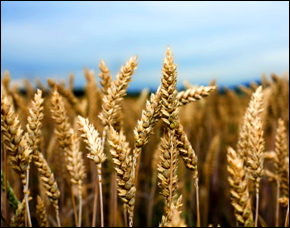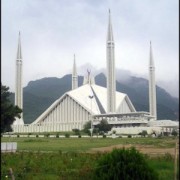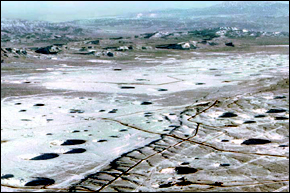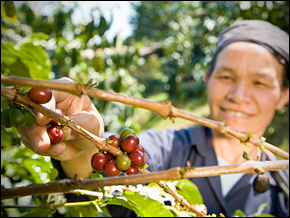“Food Security and Climate Change Are Deeply Interconnected,” UN Secretary-General Says
 Farmers are hurt by erratic water supplies and underinvestment, according to summit speakers. Leaders weigh in on global agricultural investment during opening remarks of the FAO summit in Rome.
Farmers are hurt by erratic water supplies and underinvestment, according to summit speakers. Leaders weigh in on global agricultural investment during opening remarks of the FAO summit in Rome.
Speakers at the opening session of the World Summit on Food Security, hosted by the United Nations’ Food and Agriculture Organization, called for increased investment in agriculture and emphasized the role climate change is playing in agricultural production.
“There can be no food security without climate security,” said Ban Ki-moon, the United Nations Secretary-General to the delegates gathered in Rome. “That is why next month in Copenhagen we need a comprehensive agreement that will provide a firm foundation for a legally binding treaty on climate change.”
Global leaders are trying to accomplish a foundational agreement, instead of a full-fledged treaty, in Copenhagen. At the Asia-Pacific Economic Cooperation summit last weekend, leaders, including United States President Barack Obama and Chinese President Hu Jintao, admitted that a binding climate treaty would not be signed next month, the New York Times reported. Disagreements between rich and poor countries over emission cuts and financing climate adaptation are too wide to bridge in 2009.
Ban acknowledged that climate change’s most immediate effect on agriculture will be in water resources.
“Weather is becoming more extreme and unpredictable. In many parts of the world, water supplies are declining, agricultural land is drying out. Food security and climate change are deeply interconnected. If the glaciers of the Himalaya melt, it would affect the livelihood and survival of 300 million people in India and China and up to one billion people throughout Asia. Africa’s small farmers, who produce most of the continent’s food and depend mostly on rain, could see harvests drop by 50 percent by 2020.”
At the opening session attendees adopted a declaration that stated, among other things, despite constraints on water supplies, agricultural productivity must increase by 70 percent in output by 2050 to feed the world’s growing population.
During the G8 summit in July, Participating countries promised $20 billion over the next three years for agricultural development and emergency food aid as part of the L’Aquila Joint Statement on Global Food Security.
But not all investment can come from abroad, cautioned Jacques Diouf, the Director-General of the FAO.
“Naturally, developing countries need to devote themselves more funds from their budgets to agriculture in line with the sector’s contribution to national GDP, export earnings, income generation and employment,” Diouf said at the conference in Rome. “To eradicate hunger, agriculture’s share in government expenditure of low income, food deficit countries needs to be raised to 10 percent for investment.”
The 10 percent threshold is already the goal in Africa.
At the 2003 African Union meeting, heads of state adopted the Maputo Declaration, promising to increase agricultural investment to 10 percent of each nation’s budget by 2008.
However, the timetable for implementation may have been too ambitious, according to an evaluation in 2007 by the New Partnership for Africa’s Development (NEPAD).
NEPAD found that while the number of countries spending more than 10 percent had doubled, 50 percent of the AU countries were still spending less than five percent of their budgets on agriculture.
The World Summit on Food Security will address these topics in depth Tuesday and Wednesday with roundtable discussions on global governance, climate change adaptation and rural development.
Source: World Summit on Food Security
Read the summit’s declaration on food security here. Or listen to opening remarks at the summit here.
Return tomorrow for Circle of Blue’s coverage of Day Two of the food security summit
Brett writes about agriculture, energy, infrastructure, and the politics and economics of water in the United States. He also writes the Federal Water Tap, Circle of Blue’s weekly digest of U.S. government water news. He is the winner of two Society of Environmental Journalists reporting awards, one of the top honors in American environmental journalism: first place for explanatory reporting for a series on septic system pollution in the United States(2016) and third place for beat reporting in a small market (2014). He received the Sierra Club’s Distinguished Service Award in 2018. Brett lives in Seattle, where he hikes the mountains and bakes pies. Contact Brett Walton









Day by day, the number of people believing all this gloom and doom hype you idiots are spewing is dropping.
I mean how stupid do you think we are? “Climate Change”??? So, you all realize the temp avg is actually dropping and you rename it “Climate Change”! To me the name is so in your face absurd that maybe that’s why some people have bought the whole scam.
OMG “Climate security”, you guys are more arrogant than the mighty Obama as if you have any control over the enviroment at all to “Secure it”
You should check your tweed coats because the chemicals in them are making you delusional or evil, not sure which one!
food security is very very important in the world. becz of the poverty is high in the world. dont waste food $ we want food security. thanking u